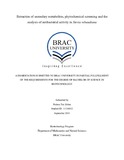Extraction of secondary metabolites, phytochemical screening and the analysis of antibacterial activity in stevia rebaudiana

View/Open
Date
2015-09Publisher
BRAC UniversityAuthor
Zohra, Fatima TuzMetadata
Show full item recordAbstract
Stevia rebaudiana is a plant of the Asteraceae family and native to Paraguay. Its sweetness and calorie free property has increased its demand commercially all over the world as a sugar substitute in food beverages and medicines. Stevia has many pharmacological and therapeutic properties including antimicrobial, antifungal, antioxidant and anticarcinogenic activity. Due to this importance the leaf was analyzed for preliminary phytochemical studies to find the presence of phytoconstituents such as alkaloids, flavonoids, steroidal compounds, sponins, tannins, phenols, and cardiac glycosides. In this study, the crude plant extract from three different extractions (ethanol, methanol, and water) were collected and tested for the presence of phytochemicals. Comparative analysis of the antimicrobial activity of the extracts was investigated against four bacterial strains (Bacillus subtilis, Staphylococcus aureus, Streptococus peneumoniae and Shigella flexnari). This was done using agar diffusion method and as controls kanamycin, tetracycline and chloramphenicol were used. The diameter of the clear zone of inhibition surrounding the disc was measured in millimeters. The results showed that methanolic and ethanolic extracts of Stevia rebaudiana contained the highest amounts of phytochemicals. Antibacterial activity results showed there is no inhibitory effect of stevia against S.aureus and S.flexnari. The highest amount inhibition was formed against B.subtilis and S.pneumoniae. It can be concluded from the results that methanolic, ethanolic and aqueous extracts of Stevia rebaudiana may be considered as an antibacterial agent against S.pneumoniae and B.subtilis and be used to source antibiotic substances.
